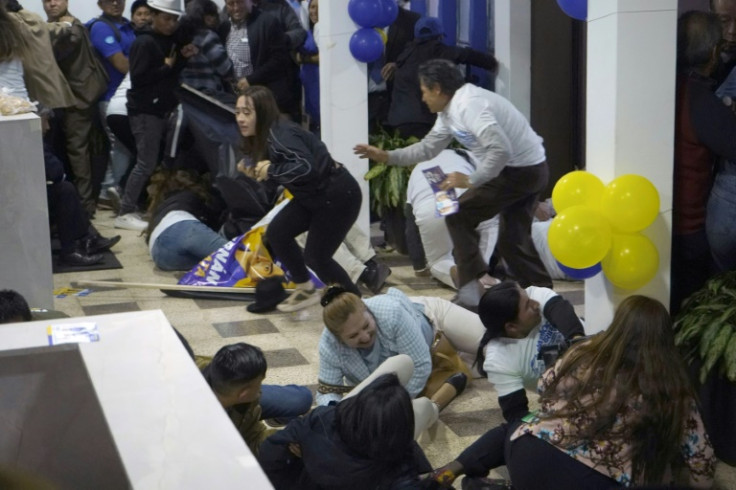
Six suspects in the August assassination of Ecuador presidential candidate and anti-corruption crusader Fernando Villavicencio were killed in prison on Friday, officials said.
The SNAI prisons authority initially announced that "an event occurred" in the Guayas 1 prison in Guayaquil "resulting in six dead people."
It later clarified the deceased were "of Colombian nationality and accused of the murder of former presidential candidate Fernando Villavicencio."
Villavicencio, a 59-year-old journalist, was gunned down as he left a campaign rally in the capital Quito days ahead of the first round vote.
After news broke of the prison deaths, Ecuadoran President Guillermo Lasso announced he would immediately return from an international trip to handle the incident.
Lasso had traveled to New York on Thursday for personal matters, and was due in Seoul on Saturday for official trade talks.
"In the next few hours I will return to Ecuador to attend to this emergency. Neither complicity nor cover-up, here the truth will be known," Lasso said on X, formerly Twitter.
The public prosecutor's office said that its agents, along with police and the military, were "executing security protocols... in light of the disturbance that occurred Friday afternoon."
It added in a statement on X that "in the coming hours, specialized military personnel will carry out the first raids and reconnaissance of Cellblock 7, where the incidents originated, to take control of the situation."
Guayas 1 is one of five facilities that make up a large prison complex in Guayaquil, a key port city that has become one of the country's increasingly bloody centers of a turf war between rival drug-trafficking gangs.
In late July, a riot in the Guayas 1 prison left more than 30 people dead.
The assassination of Villavicencio, who had been polling in second place, rocked Ecuador days ahead of national elections in which corruption and the country's declining security situation were major themes.
Six Colombians with long criminal records were arrested shortly after, while a seventh was killed at the scene of the crime.
Villavicencio had carried out scores of investigations, including exposing a vast graft network which led to former president Rafael Correa being sentenced to eight years in prison.
Correa fled the country to avoid jail time and has been exiled in Belgium for six years.
Villavicencio had drawn the ire of gangs and drug traffickers with his reputation for speaking out against the cartels, many of which operate out of prisons across Ecuador.
More than 430 inmates have died violently since 2021, dozens of them dismembered and incinerated amid disputes between rival gangs.
In late August, dozens of guards were taken hostage at several prisons around the country before eventually being released.
On Ecuador's streets, homicides have quadrupled between 2018 and 2022, climbing to a record 26 per 100,000 inhabitants.
That rate could climb as high as 40 this year, according to experts.
Ecuador was once a peaceful haven nestled between the world's largest cocaine producers -- Colombia and Peru.
However, the war on drugs in other South American nations displaced drug cartels to Ecuador, which has large Pacific ports with laxer controls, widespread corruption, and a dollarized economy.
The prisons crisis has become a key point of debate ahead of the second round election on October 15, between leftist lawyer Luisa Gonzalez and 35-year-old upstart Daniel Noboa.
Noboa has proposed leasing ships to hold the country's most violent prisoners offshore.




